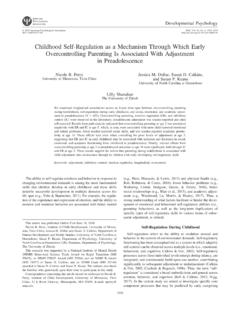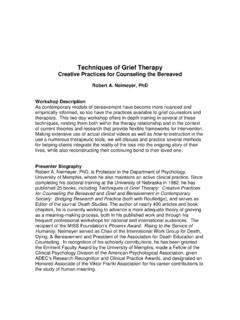Transcription of Psychology Internship Development Toolkit …
1 Psychology Internship Development Toolkit Revised September 2015. Council of Chairs of Training Councils (CCTC). The Psychology Internship Development Toolkit ( Internship Toolkit or Toolkit ) was envisioned by CCTC to assist psychologists with information about developing internships in professional Psychology . CCTC is composed of training councils in professional Psychology , and therefore the vision for the Toolkit was broad-based and designed to partially address concerns with the current Internship imbalance. The original Toolkit was compiled and developed by a work group of CCTC, and it was available on the CCTC website in February 2010. The original work group committee consisted of the following psychologists (listed in alphabetical order): Sharon Berry, PhD. Clark D. Campbell, PhD (Chair). Kathlyn Dailey, PhD. Luli Emmons, PhD. Catherine Grus, PhD. Philinda Hutchings, PhD. Lorraine Mangione PhD.
2 Roberta Nutt, PhD. Wayne Siegel, PhD. The original authors were asked by the CCTC to revise the Toolkit and request participation by representatives from additional training councils. In the spring of 2013 the following psychologists were added as authors of the revised Toolkit : Kevin Antshel, PhD. Rupal Bonli, PhD. Jenny Cornish, PhD. Mike Vanderwood, PhD. Together, these psychologists represent several groups* that participate in CCTC and have a vested interest in professional education and training in Psychology . The Toolkit is intended to provide resources that can be used to facilitate institutional and financial support for creating and expanding Internship programs. The revised Toolkit adds new information, deletes outdated information, and provides updated web links to various resources. The work group members are committed to the Development of quality internships in professional Psychology , and because of this commitment to our students and the profession we collaborated in providing significant and sustained energy to complete this revision in a timely manner.
3 Our hope is that the Toolkit will help ameliorate the imbalance between the numbers of 2. students seeking internships and the number of available positions, and thereby serve the public and profession effectively. The framework of the Toolkit is organized around individual sections, each of which represents a core component related to the structure of an Internship program. The sections address the following topics: Rationale for Developing Internships Settings and Structures Funding Administrative issues Legal and Ethical Issues Quality Assurance Mechanisms Mentoring Resources and Emergency Recovery Procedures Although the Toolkit is designed as a whole document, it is structured so that each section can be accessed and used independently. Several of the embedded links to websites in the revised Toolkit will provide additional information. Disclaimer: Much of the information contained in the Toolkit is a compilation of existing resources.
4 However, it has been developed and arranged in a manner that should facilitate easy use by those professionals interested in creating an Internship in professional Psychology . The reader is encouraged to follow web links to other documents in order to obtain additional information about specific areas. As a living document, the Toolkit will need to be updated from time-to-time so that it is relevant and current. We believe that the CCTC will assure this updating process. * The authors represent the following groups, which participate in the Council of Chairs of Training Councils: American Psychological Association (APA). Association of Counseling Center Training Agencies (ACCTA). Association of Psychology Postdoctoral and Internship Centers (APPIC). Canadian Council of Professional Psychology Programs (CCPPP). Council of Counseling Psychology Training Programs (CCPTP). Council of University Directors of Clinical Psychology (CUDCP).
5 National Council of Schools and Programs of Professional Psychology (NCSPP). VA Psychology Training Council (VAPTC). 3. Introduction Background The availability of quality doctoral internships for students in professional Psychology is one of the most significant issues being addressed by the education and training community at present. This Psychology Internship Development Toolkit ( Internship Toolkit ) represents one of a number of initiatives underway directly resulting from conversations by leaders in education and training about the imbalance between the number of students seeking doctoral internships and the number of positions available in the Internship match. The purpose of the Internship Toolkit is to provide a comprehensive, easy to use, online resource for those seeking to create or expand accredited doctoral Internship training programs. First developed in 2010, this version is updated to reflect advancements and other changes that have occurred since then.
6 The Internship Toolkit is a product developed by the Council of Chairs of Training Councils (CCTC). CCTC was created in the mid-1980's as an umbrella organization that brought together leadership from education and training councils in professional Psychology . While early in its inception CCTC focused on promoting communication between its members the last decade has seen a shift in focus to developing and disseminating resources to enhance education and training in professional Psychology . Several members and liaisons to CCTC. volunteered to develop both the original and revised versions of the Internship Toolkit in addition to efforts by several individuals from the training councils represented on CCTC. At the March 2012 CCTC meeting the original Internship Toolkit authors were encouraged to revise the document and include authors from other training councils. Following this meeting, the nine original authors and four new authors began work on this revision.
7 The concept of the Internship Toolkit originated at a meeting that occurred in September 2008 prompted by discussion by CCTC in late 2007 and early 2008 on the need for a focused, action oriented, conversation about the match imbalance. Specifically, this call was raised by those members of CCTC most impacted by the Internship match imbalance. These included five doctoral training councils: the Council of Combined and Integrated Doctoral Programs in Psychology (CCIDPIP), the Council of Counseling Psychology Training Programs (CCPTP), the Council of Directors of School Psychology Programs (CDSPP), the Council of University Directors of Clinical Psychology (CUDCP), and the National Council of Schools and Programs in Professional Psychology (NCSPP) as well as American Psychological Association Education Directorate (APA), the American Psychological Association of Graduate Students (APAGS), and the Association of Psychology Postdoctoral and Internship Centers (APPIC).
8 The meeting was co-convened by APPIC and the APA Education Directorate who covered general meeting expenses, while each of the groups was responsible for the travel expenses for their representative. One representative from each group attended and was empowered by their organization or unit with decision making capacity regarding actions their group was willing to engage in to impact the match imbalance. The meeting occurred over a one and a half day period at the end of which an agreed upon action plan had been developed. This Internship Toolkit represents one of eleven action steps agreed upon at the meeting. Further, at the meeting the following core principles were agreed upon by the groups: 4. 1. We have a collective responsibility for actions to address the match imbalance. 2. Collaborative efforts across the groups will benefit students and professional Psychology . 3. Continuing attention to the match imbalance is required and necessitates the Development of strategies that can be implemented in the short-, mid-, and long-term.
9 4. Any action designed to impact the quantity of positions must ensure that the quality of education and training experiences is maintained. While these core principles underlay the Development of this Internship Toolkit , item number four is particularly salient. It is the intent of the crafters of this document that doctoral Internship training provide high quality experiences to students and that the resources contained within help programs in doing so. It is also hoped that the Internship Toolkit will assist programs in moving toward formal recognition of quality through such methods as accreditation by the American Psychological Association (APA) consistent with the recently approved APA. resolution on accreditation that states: APA affirms that health service psychologists must be trained in APA/CPA accredited doctoral and APA/CPA accredited Internship programs or programs accredited by an accrediting body that is recognized by the Secretary of Education for the accreditation of professional Psychology education and training in preparation for entry to practice (APA, 2013).
10 The gathering that occurred in 2008 to discuss the Internship imbalance was repeated in 2012. The same organizations were represented although the individuals attending were different. The focus of the meeting in 2012 was to discuss additional actions that could be taken and affirm which of the action steps were of continued relevance. The Internship Toolkit was deemed such an item. A Historic Perspective on Internship Training The first widespread doctoral internships arose out of a need for psychologists to provide services to veterans of World War II. Financial resources from the federal government through the Department of Veteran's Affairs were provided for training to develop the needed workforce. Federal support from the National Institute of Mental Health later provided large scale, additional, financial support for internships. However, federal support for internships has declined, consequently the economic structure of internships has dramatically changed.

















